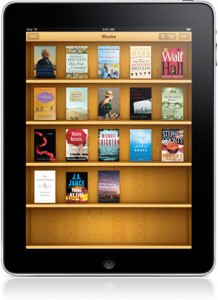Amazon on Monday announced a new app designed specifically for Apple’s iPad and other tablet devices. It’s not a big surprise that they will have an app, but can they compete against Apple on the platform?  I think the answer to that is yes, at least in the short term.
I think the answer to that is yes, at least in the short term.
I’m not a big fan of the Kindle, but according to Amazon, “millions” of people have purchased the device. Amazon also claims it sells six e-books for every 10 physical books. Those aren’t free books, either, so that’s a good number.
The Kindle obviously has a loyal following. Last year, Amazon released the Kindle app for iPhone, giving users the ability to read their Kindle books on that device. Certainly, a good move for Amazon.
However, the iPad is different. Unlike the iPhone, Amazon will compete directly with Apple when the iPad comes out.
One of the new features of the iPad will be iBooks, Apple’s own online e-book store. The application will be available free from the App Store when the iPad is released on April 3.
This will inevitably cause some concern for Amazon. Apple tends to dominate many of the consumer markets it enters, and make no mistake, they will work very hard to dominate this one too.
What Amazon has going for it is a strong, existing customer base. For the same reason Apple’s competitors find it hard to compete in the music and video space, Apple will find it hard to compete against Amazon.
However, I don’t think that will last long. Apple has one of the best mobile delivery systems ever built in iTunes. That is going to be key to e-book distribution for Apple and they have a proven track record. They can get it done.
It’s not like Apple is starting off with nothing. Houghton Mifflin Harcourt, Kaplan Publishing, McGraw-Hill Education, and Pearson have all signed on to deliver textbooks and Hachette Book Group, HarperCollins Publishers, Macmillan Publishers, Penguin Group and Simon & Schuster will deliver mainstream books.
It will be interesting to see how many books Apple can sell in the first couple of quarters.
